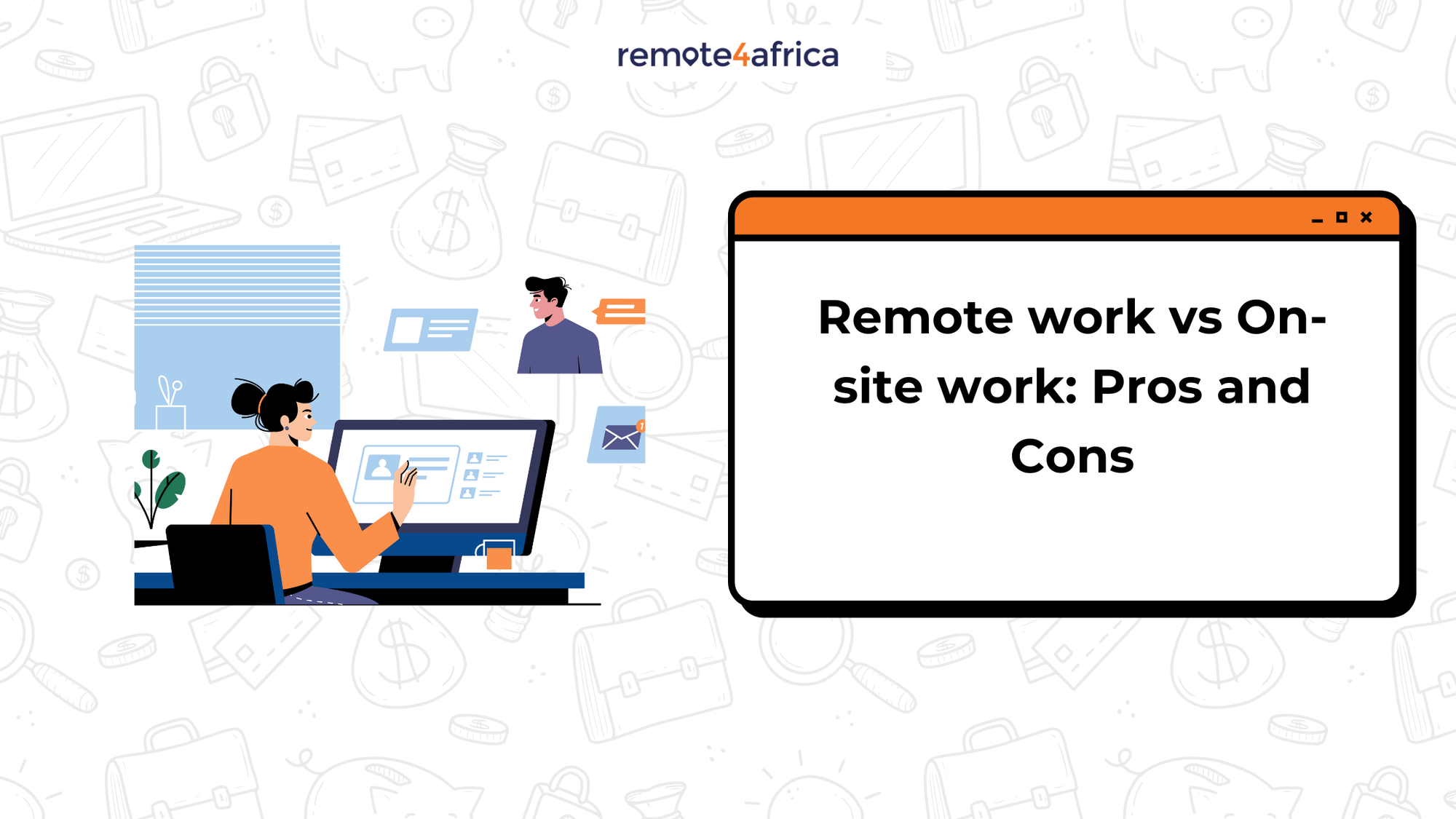Remote Work vs On-site Work: The Pros and Cons for Newbies

Many factors have shaped the culture and system of work in the world today and one of the major drivers of this change was COVID. It transformed work from traditional on-site roles to remote or hybrid work systems. Due to this situation, many keep debating if remote is indeed the future of work or if on-site work should be brought back to reinstate some work culture that remote work has removed.
Individuals would argue based on their current work arrangement which may not give a good and balanced comparison. As a result, we will examine both remote and on-site work systems including their pros and cons to make a solid comparison.
Differences Between Remote Work and On-Site Work
Remote work and on-site work differ in diverse ways and go beyond location and tools. Here are some of the differences between the two work models;
- Nature of Work: Remote work does not require workers’ presence at the company’s physical workspace while on-site work requires workers at the workplace.
- Technology: Remote work relies heavily on technology. Most productivity work tools such as instant messaging, file sharing, cloud-based storage, note-taking and video-conferencing tools are all needed in remote work while onsite work relies on work tools that cannot be used remotely.
- Flexibility: Remote work can be highly flexible depending on deliverables and productivity. Remote workers do not necessarily have to work within a defined hour as long as they meet targets. On-site work on the other hand is not flexible as workers have to work within defined hours making it rigid rather than flexible.
- Communication: Remote workers rely on instant messaging apps which can either be in real-time or asynchronous while on-site workers have direct and quick conversations physically and via follow-up emails.
- Team Collaboration: Team collaborations happen via collaboration tools for remote workers while on-site workers hold team meetings and sync to collaborate.
Pros and Cons of Remote Work
Pros of Remote Work
Remote workers enjoy many benefits as well as remote companies. Here are some of those benefits;
- For companies, remote work can be an advantage as they don’t have to cover costs for office equipment and facility management.
- Remote work has proven to boost productivity so remote companies enjoy this from their workers.
- Remote workers enjoy flexibility in work hours which means they can work at any time of the day as long as they meet their work deliverables.
- Remote workers save up on commuting costs and office outfits.
- Remote work systems help remote companies reach global talents since there is no geographical barrier to work. Companies can employ global talents from anywhere in the world.
- Employees are generally satisfied with their jobs and get a sense of control and management that keeps them motivated.
Cons of Remote Work
- Remote workers tend to face poor communication due to factors such as time differences, network glitches and miscommunication.
- Remote work can make employees feel isolated as they have no physical human interactions.
- It can be tricky to separate personal life from work life when working remotely. Remote work can put you in a work mode state even when you are done with work since you are still in the same space where you worked.
- There can be an increase in security breach risks.
- Its heavy reliance on technology can cause delays in business operations when technological issues arise.
Pros and Cons of On-Site Work
With the seemingly declining popularity of on-site work, it still has its advantages and disadvantages. Keep reading to learn about them;
Pros of On-Site Work
- On-site work promotes clear communication with in-person communication
- There is a clear separation between personal and work life.
- On-site work helps with better management and support.
- It improves teamwork and collaboration.
- It also promotes the company culture.
Cons of On-Site Work
- On-site work means more operational costs for companies.
- There is a lack of flexibility in terms of work hours as employees need to work and deliver within specified hours.
- There is a low work-life balance which can potentially cause work stress.
- Unlike remote work, there is a limited talent pool as companies are unable to recruit across borders.
- There will be potential for office drama, politics and gossip which can be distracting.
Conclusion
Remote and on-site work both have their disadvantages and advantages. You can choose what works best for you since they can both be fulfilling and challenging.
